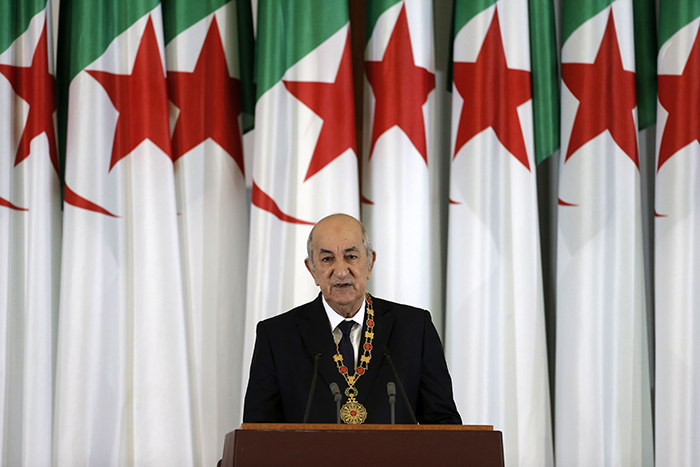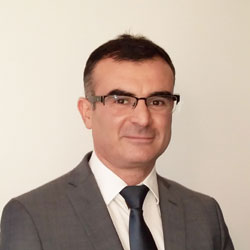Interviews / Observatory of the Maghreb
12 September 2024
Presidential Election in Algeria: Change Will Have to Wait

On September 7, 2024, the first round of Algeria’s presidential election took place, during which Abdelmajid Tebboune was elected with 94.65% of the vote. The Algerian president was keen to assert his legitimacy to govern, a power he has held since the Hirak protests challenged the Algerian political system. Despite an overwhelming score, Tebboune faced a massive abstention from the population. Resignation to political immobility seems to have taken hold of the voters. What were the stakes of this election for the candidates, the population, and the diaspora? What could be the geopolitical implications of Abdelmajid Tebboune’s re-election, particularly concerning Algerian foreign policy? Insights from Brahim Oumansour, Associate Researcher at IRIS and Director of the Maghreb Observatory.
The first round of the Algerian presidential election took place on September 7, 2024, five years after the Hirak protest movement. In what political and social context did this election occur? What was at stake in this election for President Abdelmajid Tebboune?
The Algerian presidential election on Saturday, September 7, concluded with the re-election of Abdelmadjid Tebboune for a second term, securing 94.65% of the vote, against two candidates: Abdelaali Hassani from the Islamist party, the Movement of Society for Peace (MSP), and Youcef Aouchiche from the Front of Social Forces (FFS), who garnered 3.17% and 2.16%, respectively, according to results announced by the National Independent Election Authority.
In truth, Tebboune’s re-election was highly anticipated. The main issue of this election was voter turnout, with President Tebboune hoping to strengthen his legitimacy and that of the system, which had been seriously eroded since the Hirak protests. However, despite the president’s high score, the election saw a record abstention rate of 76%, higher than that of 2019. This reflects a lack of enthusiasm for an election that many Algerians believe was already decided in advance, and it took place in a politically tense climate marked by repression against journalists and activists. It is important to note that the authorities had tightly controlled the political and media space in response to the 2019 Hirak protest movement, which began in February against Abdelaziz Bouteflika’s fifth term and, by extension, called for a change in Algeria’s political system. The participation of the two most established parties in the country, FFS and MSP, did not attract much interest either.
Additionally, the National Independent Election Authority (Anie), created in 2019 mainly to lend credibility to the election, instead cast doubt on the transparency of the process due to its chaotic management of the presidential election. The ambiguity and contradictions in the announced figures are an example, which were contested by all three candidates, including Abdelmadjid Tebboune, the eventual winner.
Economically and socially, the situation is somewhat positive due to an economic boost driven mainly by the surge in energy prices since the start of the war in Ukraine. This has allowed the Algerian state to complete some housing projects and implement social measures such as the introduction of unemployment benefits. However, inflation, around 10%, has significantly weakened purchasing power, especially for the middle class and the lower-income groups.
What role did the Algerian diaspora, particularly the French one, play in the discourse of Abdelmadjid Tebboune and the other candidates?
The Algerian diaspora is estimated to be around 7 million people, primarily residing in France. It now includes highly qualified professionals who have graduated from major universities and schools in France or North America. The participation rate announced by the National Independent Electoral Authority (ANIE) is around 20%, which is similar to the rate recorded in Algeria.
For a long time neglected, President Tebboune has shown a particular interest in the diaspora during his first term, aiming to use it as a lever for the country’s economic development and in its relations with France and other partners.
To my knowledge, only the supporters of the outgoing president mobilized in France and organized rallies in several cities on the mainland: Marseille, Lyon, Paris, Lille, etc. However, there were no visits by the candidates to France. Likewise, there had been very few candidate visits in Algeria. The electoral campaign was almost nonexistent on Algerian soil, with very few meetings and a mediocre level of engagement.
The Algerian diaspora largely shares a sense of fatigue and disappointment with the government, which struggles to reform the country’s political and economic systems.
What impact can Abdelmajid Tebboune’s re-election have on Algeria’s foreign policy, especially in light of the intensification of tensions with Rabat and Paris following France’s recognition of Morocco’s sovereignty over Western Sahara?
Abdelmadjid Tebboune’s re-election requires him to learn from the past and consider the overhaul of a foreign policy capable of addressing the various challenges. Algeria operates in a very unstable regional environment, which has recently seen developments that pose a threat to the country and contribute to its isolation. Despite the ambition displayed and the diplomatic activism over the past five years, Algiers has failed to impose its roadmap.
First, Algeria is involved in the Western Sahara issue through its support for the Polisario Front, which claims the right to self-determination for this territory, formerly under Spanish rule. However, for the past decade, Morocco has been accumulating diplomatic successes with a series of recognitions of its sovereignty, culminating in one from Donald Trump in December 2020, as his term as US president was ending. Other events, such as the Pegasus espionage affair, have contributed to the escalation of tensions between Algiers and Rabat, culminating in a diplomatic rupture between the two countries. This was followed by Spain’s reversal when Prime Minister Pedro Sánchez, in a letter to the Moroccan monarch, announced his support for the autonomy plan for Western Sahara under Moroccan sovereignty, triggering tensions with Algiers, which suspended the friendship treaty between the two countries and blocked the import of Spanish goods for several months. This did not prevent French President Emmanuel Macron from doing the same last August, using the same method as his Spanish counterpart. Algiers responded by withdrawing its ambassador to Paris and suspending some cooperation agreements. Paris fears that more drastic measures may be taken by Algiers after the elections, such as blocking the import of French products, noting that there are about 450 French companies in Algeria.
Moreover, Algeria is concerned about the arc of crises that has developed on its borders, marked by the presence of more aggressive and active foreign actors, mainly Israel, the United Arab Emirates, Turkey, and Russia, via the Wagner paramilitary group. This deeply disrupts its non-interventionist doctrine. This has been particularly evident since the last coup in Mali, which brought Assimi Goïta to power. He aims to regain control of northern Mali by force against the Tuareg rebel groups, with the support of the Wagner paramilitary group. After pushing the French military out of Mali, Bamako launched a military offensive in the north, and in January 2024, Assimi Goïta denounced the 2015 Algiers Agreement and criticized Algerian diplomacy.
Similarly, in Libya, Marshal Khalifa Haftar recently positioned his forces in southwestern Libya (Ghadames), along Algeria’s borders. This raises doubts about Haftar’s intentions for a new offensive against the Government of National Unity in Tripoli. Therefore, Algiers is concerned about a new regional escalation on its borders.

